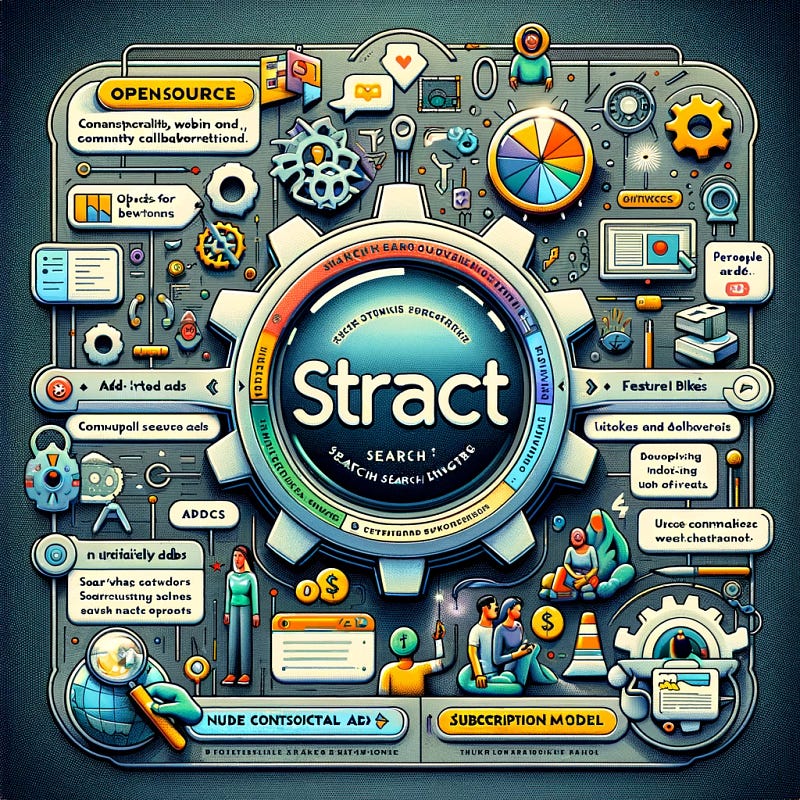Tired of searching for something only to get advertisements and duplicates? Stract is there for you.
In the digital age, where information is as ubiquitous as the air we breathe, the tools we use to sift through data should uplift, not undermine, our quest for knowledge.
Yet, here we are, navigating the choppy waters of search engines like Bing and Google, only to find ourselves awash in a sea of advertisements, our privacy eroded by relentless tracking, and our quest for truth skewed by biased algorithms.
Does that seem okay to you?
These platforms, once hailed as the lighthouses of the information age, now seem more like will-o’-the-wisps leading men to their deaths in murky bogs. Radicalization through search engine siloing is a real problem. For all that Google has claimed it’s fighting against such things, the work of researchers like Cory Doctorow and Rebecca Giblin have proven that these companies can’t ever fulfill their promises… not when they rely on radicalization to help line their shareholder’s wallets.
Enter Stract, a new lighthouse, one built with decentralization and open-source values in mind.

This innovative search engine feels like a callback to an earlier Internet age, when our networks were meant to be part of a free, open-source ecosystem. Tim Burners-Lee, eat your heart out.
Now, to be clear, Stract is in an early “Beta” stage. This means that it’s lacking many QoL features that are common in modern browsers. You won’t be using it for your daily driver quite yet (I recommend Brave and DuckDuckGo for the time being). That said, it’s got huge potential.
The top ten main features of Stract include:
- Open Source: Stract is entirely open-source, promoting transparency and community collaboration in its development and enhancement.
- Customization: The platform stands out for its high degree of customizability, allowing users to tailor their search experience to their preferences.
- Own Web Index: Unlike other search engines that might rely on larger entities for their results, Stract uses its own web index, contributing to unique and diverse search outcomes.
- Optics Feature: A distinctive feature called “Optics” enables users to apply customizable instructions for the search engine. This aids in searching for specific types of content or limiting searches to particular websites, enhancing the relevance and precision of search results.
- User Control Over Results: Stract allows users to “like,” “dislike,” or “block” specific websites, giving them significant control over the content that appears in their search results.
- Ad and Tracker Free Searches: The engine prioritizes user privacy by allowing the de-ranking of websites that contain third-party trackers or numerous ads.
- Future Contextual Ads and Subscription Model: Plans for eventual monetization include contextual ads (a la DuckDuckGo) related to specific search terms without tracking users, and offering ad-free searches to paying subscribers.
- Continuous Improvement: Being in active development, Stract is rapidly improving based on user feedback and developer updates, ensuring a progressively enhanced search experience.
- Community and Developer Engagement: The project encourages use and discussion about its development, inviting more contributors to join its community-driven improvement process.
Stract embodies a pioneering spirit in the search engine domain that we really haven’t seen in years. It promises a user-centric, customizable, and privacy-respecting alternative amidst a landscape of privacy-invading, ad-driven models. And, with its customizable features, Stract could empower users to tailor their exploration on the Internet.
When placed side by side with the giants of the industry — Google, Bing, and even the privacy-focused DuckDuckGo — Stract really shines.
For anyone who, like myself, has been yearning for a search experience that respects their intelligence and privacy, Stract is not just an alternative, it’s a revolution.

